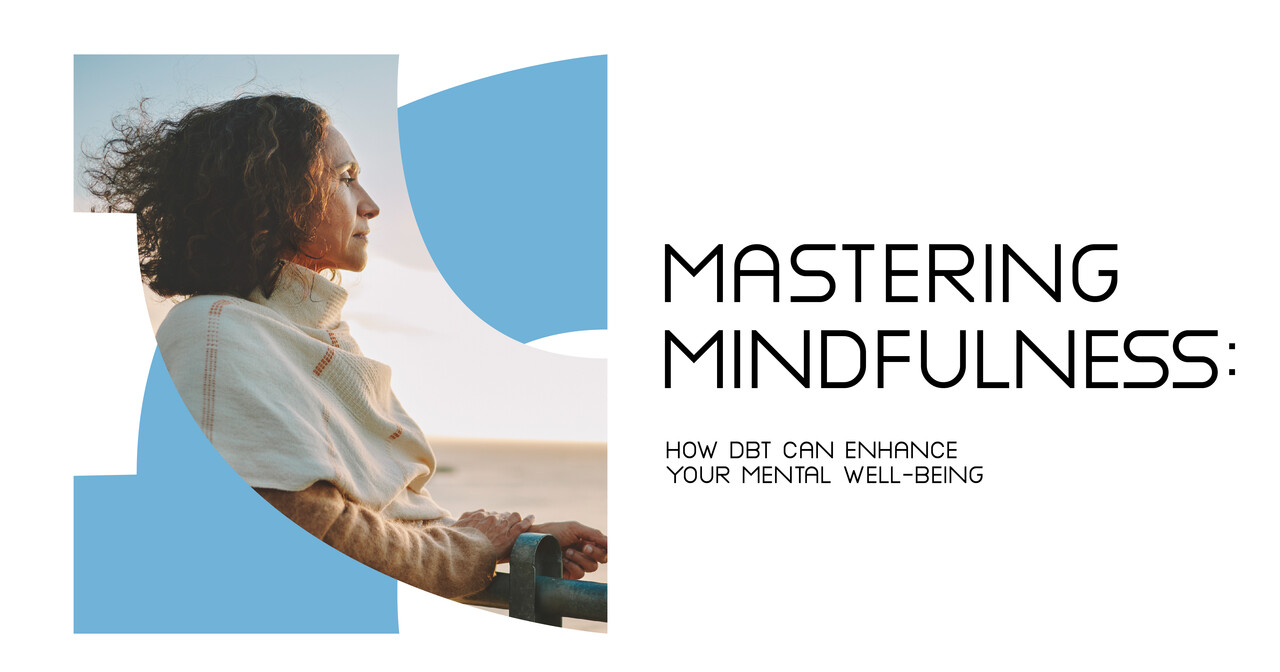Mindfulness is a transformative tool in mental health therapy, and Dialectical Behavior Therapy (DBT) is a highly effective method for cultivating mindfulness to enhance overall mental well-being. Developed by Dr. Marsha Linehan, DBT integrates mindfulness with cognitive-behavioral techniques to help individuals manage intense emotions, improve interpersonal relationships, and achieve a balanced life. This comprehensive guide explores how mastering mindfulness through DBT can significantly enhance your mental well-being.
Understanding DBT and Mindfulness
What is Dialectical Behavior Therapy (DBT)?
Definition: DBT is a form of cognitive-behavioral therapy designed to help individuals manage intense emotions, improve relationships, and build a life worth living. It is particularly effective for those struggling with borderline personality disorder and other mental health conditions.
Components: DBT combines individual therapy with group skills training in four key areas:
- Mindfulness: Cultivating awareness and acceptance of the present moment.
- Distress Tolerance: Building resilience in the face of crises.
- Emotional Regulation: Managing and transforming intense emotions.
- Interpersonal Effectiveness: Enhancing communication and relationship skills.
These components work together to create a comprehensive approach to therapy.
The Role of Mindfulness in DBT
Definition: Mindfulness in DBT involves being present in the moment and accepting one’s thoughts, feelings, and sensations without judgment. This crucial component helps individuals observe their thoughts and feelings objectively, reducing emotional suffering and promoting emotional well-being.
Purpose: Mindfulness techniques in DBT help individuals manage distressing emotions and navigate difficult situations, ultimately enhancing mental health treatment outcomes.
Key Mindfulness Techniques in DBT
1. Observing and Describing
How It Works:
- Observing: Paying attention to your surroundings, thoughts, and emotions without getting caught up in them.
- Describing: Putting your observations into words without interpreting or judging.
Examples:
- Observing: Noticing the sound of rain or the sensation of your breath without becoming overwhelmed.
- Describing: “I hear the rain falling,” rather than “I am feeling sad because of the rain.”
Benefits:
- Increased Awareness: Helps you stay grounded in the present moment and manage self-destructive behaviors.
- Reduced Reactivity: Lessens the impact of negative emotions and harmful behaviors.
Competitor Insights: Verywell Mind discusses observing and describing as foundational mindfulness skills. This article will provide deeper insights and practical applications for these techniques, including how they can be applied in therapy sessions.
2. Mindful Breathing
How It Works:
- Technique: Focusing on your breath to anchor yourself in the present moment.
- Practice: Take slow, deep breaths while paying attention to the sensation of the air entering and leaving your body.
Examples:
- Breathing Exercise: Inhale deeply for four counts, hold for four counts, exhale for four counts, and repeat.
- Daily Practice: Using mindful breathing during stressful situations or as part of a daily meditation practice.
Benefits:
- Stress Reduction: Calms the mind and body, helping manage stressful situations and anxiety disorders.
- Improved Focus: Enhances concentration and mental clarity.
Competitor Insights: Psychology Today highlights breathing techniques as a core mindfulness practice. This article will expand on how mindful breathing can be incorporated into daily life to improve emotional regulation and quality of life.
3. Radical Acceptance
How It Works:
- Technique: Embracing reality as it is, without resistance or judgment.
- Practice: Acknowledging that some things are beyond our control and accepting them to reduce suffering.
Examples:
- Acceptance Exercise: Reflecting on a challenging situation and affirming, “This is how it is right now.”
- Daily Practice: Applying radical acceptance to situations where you feel powerless or frustrated, such as interpersonal difficulties.
Benefits:
- Emotional Freedom: Reduces feelings of frustration and helplessness, particularly useful in managing suicidal behavior and self-destructive behaviors.
- Increased Resilience: Builds strength to cope with difficult circumstances and distress-related emotions.
Competitor Insights: GoodTherapy discusses radical acceptance as a DBT technique. This article will explore its role in enhancing mental well-being through real-life applications and therapy programs.
4. Mindful Walking
How It Works:
- Technique: Combining mindfulness with walking to enhance awareness and presence.
- Practice: Pay attention to each step, the movement of your body, and your surroundings.
Examples:
- Walking Exercise: Focus on the sensation of your feet touching the ground and the rhythm of your steps.
- Daily Practice: Using mindful walking as a form of moving meditation to improve physical well-being and emotional growth.
Benefits:
- Mental Clarity: Helps clear your mind and reduce stress, which can be beneficial in managing substance abuse and other mental health struggles.
- Physical Well-being: Promotes physical activity and mindfulness simultaneously.
Competitor Insights: The National Center for Biotechnology Information (NCBI) covers mindful walking as a therapeutic practice. This article will offer detailed methods and benefits of this technique in clinical settings.
The Benefits of DBT Mindfulness for Mental Well-being
1. Enhanced Emotional Regulation
How It Helps:
- Techniques: Mindfulness techniques in DBT help manage intense emotions and reduce emotional reactivity. Techniques such as mindful breathing and observing can aid in managing anger or anxiety.
Examples:
- Using these techniques: Manage emotional outbursts and improve interpersonal effectiveness in personal relationships.
Benefits:
- Emotional Balance: Helps individuals regulate their emotions and respond to challenges calmly.
- Improved Relationships: Reduces emotional outbursts and fosters healthier interactions with others.
Competitor Insights: PsychCentral emphasizes the role of mindfulness in emotional regulation. This article will provide practical examples of how DBT mindfulness techniques achieve these outcomes.
2. Increased Self-Awareness
How It Helps:
- Techniques: Mindfulness practices in DBT increase awareness of thoughts, feelings, and behaviors. Reflecting on personal triggers and developing insights into emotional responses can enhance self-awareness.
Examples:
- Gaining insights: Into personal mental health needs and fostering personal growth through self-reflection.
Benefits:
- Self-Discovery: Enhances understanding of oneself and personal mental health needs.
- Personal Growth: Encourages growth through self-reflection and mindfulness practices.
Competitor Insights: Mindfulness Counseling discusses how mindfulness enhances self-awareness. This article will elaborate on the specific ways DBT mindfulness fosters personal development.
3. Improved Stress Management
How It Helps:
- Techniques: Mindfulness techniques in DBT reduce stress and promote relaxation. Practices such as mindful breathing and radical acceptance can be effective in handling stressful situations.
Examples:
- Applying these techniques: Manage daily stressors and promote a sense of calm.
Benefits:
- Stress Reduction: Helps manage daily stress and promotes a sense of calm.
- Resilience: Builds resilience against future stressors and enhances overall mental health.
Competitor Insights: Verywell Mind covers stress management techniques, and this article will explore how DBT mindfulness methods effectively reduce stress and improve mental well-being.
4. Enhanced Focus and Concentration
How It Helps:
- Techniques: Mindfulness techniques in DBT improve attention and concentration. Mindful breathing exercises can help stay focused during tasks.
Examples:
- Using mindfulness techniques: To improve concentration and productivity in daily tasks and academic performance.
Benefits:
- Better Focus: Improves ability to concentrate on tasks and responsibilities.
- Productivity: Enhances overall productivity through increased mental clarity.
Competitor Insights: GoodTherapy discusses mindfulness for improved concentration. This article will offer actionable tips for incorporating DBT mindfulness techniques to boost focus and productivity.
The Future of DBT and Mindfulness
Trends and Innovations in DBT Mindfulness
Emerging Practices:
- New Techniques: Innovations for integrating mindfulness into daily life and mental health care.
Future Directions:
- Continued Research: Development of DBT mindfulness strategies for broader applications, including residential treatment and outpatient care.
Competitor Insights: APA PsycNet discusses emerging trends in DBT and mindfulness. This article will highlight future developments and innovations in DBT practices, including their application in clinical settings and residential care.
Conclusion
Mastering mindfulness through Dialectical Behavior Therapy (DBT) offers a range of benefits for mental well-being. By exploring key techniques such as observing and describing, mindful breathing, radical acceptance, and mindful walking, individuals can enhance their emotional regulation, self-awareness, stress management, and focus.
With real-life success stories and a look at future trends, this article provides a comprehensive guide to using DBT mindfulness techniques for better mental health in 2024. Embrace these practical techniques to improve your mental health and achieve a more balanced life.
Key Takeaways
- DBT Mindfulness: A vital component of DBT that helps manage emotions and improve mental well-being.
- Techniques: Includes observing and describing, mindful breathing, radical acceptance, and mindful walking.
- Benefits: Enhances emotional regulation, increases self-awareness, improves stress management, and boosts focus.
- Future Trends: Innovations and emerging practices in DBT mindfulness for ongoing mental health improvements.









